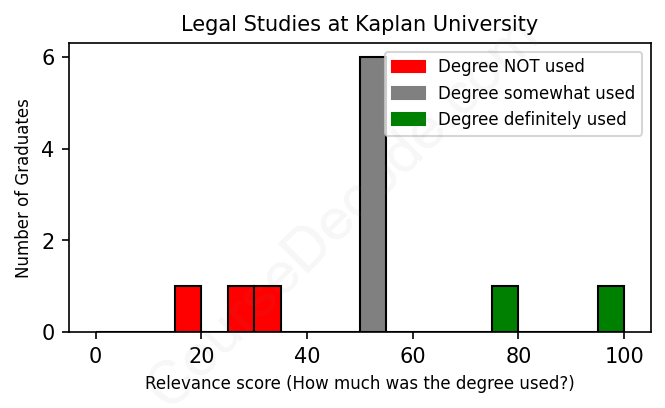
First, some facts. Of the Legal Studies graduates from Kaplan University we've analyzed , here's how many have used (or NOT used) their degree in their career:

These are estimates based on AI analysis of 11 LinkedIn profiles (see below).
The verdict? Significantly below average. Overall, with an average relevance score of 50%, Legal Studies graduates from Kaplan University have a much lower likelihood (-17%) of finding work in this field compared to the average graduate across all fields:
And for comparison, here's the chart for all profiles we've looked at across all degrees.
Also, after graduating, 36% of these graduates have pursued further education other than another Bachelor's degree (such as a Masters degree or other), compared to the average across all profiles of 35%. This suggests you may need more than just a Bachelors degree to be competitive as a Legal Studies graduate.
See the details:
|
Relevance score: 32% We think this person has NOT gone into a career related to their degree. We think this person has NOT gone into a career related to their degree.
DEGREE INFOGraduated in 2015 from Kaplan University with a Bachelor's Degree in Legal Studies. Also pursued further education since (see below). JOB HISTORY SINCE GRADUATIONMunicipal Court Clerk City of Hutchinson Kansas Aug 2015 - Jan 2016 Paralegal  Jackson County Nov 2016 - Apr 2017 Laborer/utility  Morton Salt May 2019 - Sep 2020 Barista  Sugarlump Aug 2022 - Aug 2023 Registration Specialist  Heart of the Rockies Regional Medical Center Aug 2023 - Present FURTHER DEGREES DONE SINCE GRADUATINGMaster's degreePurdue University Global 2018 - 2020 ABOUTNo information provided. |
The top 10 most common jobs done by the graduates we've analyzed (ranked most common to least) are:
People who graduated with a Legal Studies degree from Kaplan University have taken on a mix of jobs, but it seems like a good chunk of those roles are either very relevant to the law or skirting around it. A lot have worked as legal assistants, paralegals, or in roles that deal directly with property law or compliance issues, so there’s definitely a solid connection to their studies there. For instance, positions like Municipal Court Clerk and right of way title agent make full use of the legal knowledge they gained during their degrees. It's pretty clear that many of the most relevant roles directly involve legal tasks and understanding legal terminology, which makes sense since that's what they studied.
However, not all the jobs align closely with the field. Some graduates have taken up roles like financial aid advisors, retail consultants, or even travel agents, where the legal components are pretty minimal. While these positions might require some general communication or compliance skills, they don't leverage the nitty-gritty legal skills learned in school. So, in short, while there’s a decent number of graduates working in roles that relate directly to legal studies, there’s also a significant number who ended up in jobs where their degree doesn’t come into play as much. This shows that having a degree in Legal Studies can lead to a range of job opportunities, but it doesn’t automatically mean you'll work in a legal field.
Here is a visual representation of the most common words in job titles for Legal Studies graduates (this is across all Legal Studies graduates we've analyzed, not just those who went to Kaplan University):

Alright, so when we look at the career paths of graduates from Kaplan University's Legal Studies program, things are a bit of a mixed bag. Right after graduation, many seem to land roles that are somewhat relevant to legal fields, like positions as legal assistants, title agents, or municipal court clerks. However, it’s pretty clear that not everyone sticks strictly to careers in law or legal studies. Over the years, we see a lot of these graduates branching out into more varied roles, including jobs in financial advising, sales, and even positions like travel agents or care assistants. It makes you wonder if they're using their degree in practical ways, or if they just shifted focus entirely after a few years.
Fast forward a few years, and the trend continues to show a blend of legal-related jobs alongside unrelated careers. While some graduates do maintain legal roles or transition into roles that utilize their legal knowledge, like probate document research, there are quite a few who’ve drifted away entirely, ending up in fields that seem far removed from what they studied. It's important to note that the initial promise of a solid legal career doesn’t always translate into long-term success in that arena, and many find themselves in jobs that might not directly correlate with their degree. So, while some graduates are doing well in their fields, it appears there’s a significant number who have had to pivot away from their initial legal track. Overall, it’s a real mixed bag of outcomes!
Honestly, the Bachelor degree in Legal Studies can be a mixed bag depending on your strengths and interests. At Kaplan University, like many other schools, the curriculum includes a lot of reading and writing, along with critical thinking about laws and legal systems. If you're the type who enjoys diving into case studies and learning about how the legal system works, you might find it engaging rather than super tough. However, if you're not into that or struggle with analytical writing, it could feel a bit overwhelming at times. Overall, it's not the easiest degree out there, but it’s not the hardest either—just requires a solid commitment and interest in the subject.
Most commonly, in the LinkedIn profiles we've looked at, it takes people 3 years to finish a Bachelor degree in Legal Studies.
So, looking at the job history of these Kaplan University grads, it seems like they're in pretty varied fields, and not all of them are rolling in cash. Some have started in more niche roles, like right of way title agents and eligibility specialists, which probably don’t pay super high, especially early on. Others, like the grads working at the Department of Defense or running emergency management, might have decent salaries and stable positions. However, many have had roles that seem more on the entry-level side or in service-oriented jobs, which typically don't pay that well, like baristas or aides. Overall, it looks like they’ve gotten their foot in the door, but the money situation might not be all that impressive for a lot of them. It seems like they’re building their careers, but the big bucks might still be on the horizon!
Here is a visual representation of the most common words seen in the "about" section of LinkedIn profiles who have a Bachelor degree in Legal Studies (this is across all Legal Studies graduates we've analyzed, not just those who went to Kaplan University). This may or may not be useful:

Here are all colleges offering a Bachelor degree in Legal Studies (ordered by the average relevance score of their Legal Studies graduates, best to worst) where we have analyzed at least 10 of their graduates:
| College | Score | Count |
|---|---|---|
 University of Central Florida University of Central Florida
|
70 | 34 |
 University of California, Berkeley University of California, Berkeley
|
67 | 15 |
 Grand Valley State University Grand Valley State University
|
67 | 10 |
 Florida Gulf Coast University Florida Gulf Coast University
|
67 | 10 |
 St. John's University St. John's University
|
63 | 16 |
 Kaplan University Kaplan University
|
50 | 11 |
 University of California, Santa Cruz University of California, Santa Cruz
|
49 | 10 |